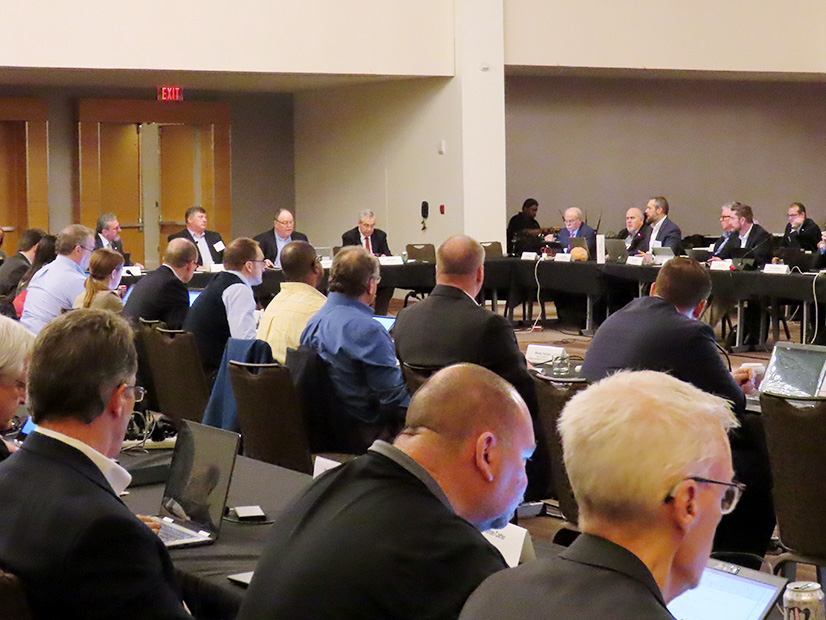
Extended Format Gives Members Breathing Room
NERC’s Reliability and Security Technical Committee (RSTC) wrapped up a two-day meeting on Thursday, its first after implementing a new schedule intended to make the group more productive.
In his opening remarks, Chair Greg Ford, of Georgia System Operations, explained that the lengthened meeting was a response to complaints that “the RSTC agendas have been very full and may have prevented a more robust discussion of the agenda items.” For instance, in last September’s meeting, discussion on some items went on so long that the committee needed an additional meeting in October to finish the agenda. (See NERC RSTC Briefs: Oct. 14, 2020.)
The committee’s new format stretches the total meeting time from six hours to 10, spread over two five-hour sessions. Lunch and break times are also kept to a minimum. Under this approach the committee managed to finish its business an hour before the scheduled time and even to insert an additional action item that was not on the original agenda.
Ford also discussed the possibility of returning to in-person meetings next year. So far the committee has held only one gathering in person, meeting briefly in Atlanta in March 2020 to discuss how to take over the business of the now defunct Planning, Operating and Critical Infrastructure Protection committees. (See RSTC Tackles Organization Issues in First Meeting.) All of its subsequent meetings — as with NERC’s other committees and standard drafting teams (SDTs) — have been held virtually because of the ongoing COVID-19 pandemic.
While the RSTC’s last meeting of 2021, scheduled for Dec. 14-15, will also be held online, committee leaders are hoping to gather in person at the next meeting, planned for March 8-9. The September 2022 gathering should also take place in person in Atlanta; the meetings in June and December 2022 will likely remain virtual, in hopes of “easing back into this process … rather than just coming back full speed” with the regular schedule, Ford said.
Subcommittee Member, DER Guideline Approved
The two-day meeting was mostly occupied by informational briefings, but members approved several action items as well, such as the addition of the Bonneville Power Administration’s Edison Elizeh to the committee’s Nominating Subcommittee. Elizeh was chosen through an open nomination process after Southern Co.’s Todd Lucas resigned from the subcommittee earlier this year, having been appointed to the RSTC’s Executive Committee.
Committee members also voted to post a new reliability guideline for distributed energy resource forecasting for a 45-day industry comment period. The guideline was submitted by the System Planning Impacts for Distribute Energy Resources (SPIDER) Working Group and includes recommendations to help transmission planners and planning coordinators establish consistent methods for gathering data and developing projections to ensure their forecasts are accurate and useful.
The motion to post the guideline for comment passed with no objections. However, several members, including SaskPower’s Wayne Guttormson and the Florida Municipal Power Agency’s Carl Turner, expressed concern that it didn’t go far enough to define useful metrics for registered entities to use.
In response, SPIDER’s Kun Zhu, of MISO, acknowledged that the group may have focused too much on “transmission planning for [the] longer term” rather than “day-to-day operations,” but he said it would “have a chance to address” those concerns after the comment period.
Field Test Item Added
Finally, members approved an action item — not included in the agenda but inserted at the request of Utility Services’ Brian Evans-Mongeon — relating to the “field trial” proposed by the SDT for Project 2016-02 (Modifications to CIP standards).
The intent of the field trial is to “obtain technical data” from transmission operators and owners to help the SDT with its revisions to the proposed standard CIP-002-6 (BES cyber system categorization). NERC’s Board of Trustees approved the standard in 2020 but decided at its February meeting to withdraw it to re-evaluate its impact on cybersecurity preparedness. (See “Standards Actions,” NERC Board of Trustees/MRC Briefs: Feb. 4, 2021.)
The SDT proposed that the RSTC provide comments on its field trial design by the end of September. In addition, the team asked that the RSTC allow its Executive Committee to “act to resolve any changes to the field trial design from comments received,” rather than waiting for the next full RSTC meeting in December. SDT members said streamlining the process for approving changes will allow them to gain approval from the Standards Committee more quickly.
RSTC members approved both requests, with an additional note that the committee does have the option to review and vote on any proposed changes in full outside of its regular meeting dates.



